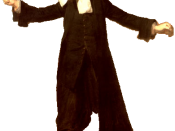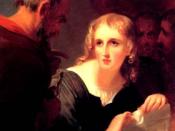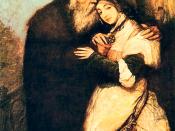How Money Killed
Many of our friends at Wall Street have serious heart problems; some of them even die years before they should because of the stress that is brought on by the money and greed of Wall Street. Money is also evident as a health risk in Macbeth and The Merchant of Venice, both written by William Shakespeare. On Wall Street people are driven by the greed of the people they represent, their own greed, and a general atmosphere of greed. In Macbeth, Macbeth is driven by personal ambition and his wife to become king at any expense, including slaying some of his personal friends and their families. Also, in The Merchant of Venice, Shylock the Jew is driven by a hatred for Christians and personal greed. In both plays the character with the greed driven personality end up on the short end of the stick.
Macbeth's and Shylock's drive of greed is revealed after just the first few scenes.
Macbeth's drive of greed is evident after his encounter with the three witches; after which he tells Banquo that he is eager to learn more about his future as king. Shylock's greed is revealed when we learn that unlike Bassanio, Shylock charges interest on all his loans, and that he is quite ruthless in getting payments for money owed. 'Three thousand ducats. 'Tis a good round sum./ Tree months from twelve, then let me see, the /rate--' (1.3.112-114). Upon this Bassanio asks Shylock if he will really owe him any interest; Shylock reacts as almost offended, and further explains that Bassanio will indeed owe him interest. For both Macbeth and Shylock, this is the beginning of the end.
Macbeth's greed starts to become a problem when people start figuring out the truth behind Duncan's death. Macbeth realizes that he...



That'sit, isit?
You basically devote a paragraph and a half to deal with all the ways money kills as recounted throughout Shakespeare's canon. Are you proud of your end result?
0 out of 4 people found this comment useful.